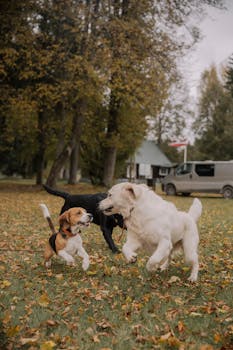Socializing Your Pet: How to Ensure a Well-Adjusted Companion

Bringing a new pet into your life can be an exciting and rewarding experience. Whether you're welcoming a puppy, kitten, or an older rescue into your home, one of the most crucial aspects of pet care is socialization. Socializing your pet is a fundamental step in ensuring they become well-adjusted, confident, and comfortable in various environments and around different people and animals.
Understanding Socialization
Socialization is the process through which a pet learns to interact with other animals, people, places, and situations. It's a vital aspect of their development, significantly impacting their behavior, temperament, and overall well-being throughout their lives.
The Importance of Early Socialization
Early socialization, particularly during a pet's formative weeks and months, is critical. For puppies, the primary socialization window is between 3 and 14 weeks old. During this period, they are more receptive to new experiences and less likely to develop fear or anxiety towards unfamiliar stimuli.
For kittens, socialization starts around 2 to 7 weeks old, and although they tend to be more adaptable, early exposure to different people, animals, and environments remains crucial.
How to Socialize Your Pet
1. Positive Exposure: Introduce your pet to various sights, sounds, smells, and experiences in a calm and positive manner. Gradually expose them to different environments, such as parks, streets, markets, and different types of flooring, to prevent fear of the unknown.
2. Meeting New People: Encourage interactions with different individuals—children, adults, elderly, and individuals of varying ethnicities and appearances. Use treats and praise to associate these encounters with positive experiences.
3. Animal Encounters: Organize controlled and safe meetings with other animals, including other dogs or cats. This helps them learn appropriate social behaviors and communication skills.
4. Positive Reinforcement: Reward desirable behavior with treats, praise, and affection. Positive reinforcement helps your pet associate good behavior with pleasant experiences.
5. Training Classes: Enroll your pet in obedience or socialization classes. These provide structured environments for learning and interacting with other pets under the guidance of a professional trainer.
6. Consistency and Patience: Socialization is an ongoing process that requires patience and consistency. Take small steps and gradually expose your pet to new experiences, ensuring they feel safe and secure throughout the process.
Challenges and Solutions
- Fear or Anxiety: If your pet displays fear or anxiety towards certain stimuli, work on gradual exposure paired with positive reinforcement. Seek professional guidance if needed.
- Overstimulation: Avoid overwhelming your pet with too many new experiences at once. Allow them to adjust at their own pace.
Benefits of a Well-Socialized Pet
A well-socialized pet tends to exhibit:
- Confidence: They are less likely to display fear-based aggression or nervous behaviors in unfamiliar situations.
- Adaptability: They are more adaptable to change, making them better equipped to handle new environments or situations.
- Reduced Behavioral Issues: Proper socialization often reduces the likelihood of developing behavioral problems, such as excessive barking, destructive behavior, or aggression.

Conclusion
Socialization is a continuous process that significantly contributes to a pet's emotional and behavioral development. By providing positive experiences, exposure, and guidance, you can help your pet become a confident, well-adjusted companion capable of navigating the world around them with ease and comfort.
Remember, every pet is unique, and some may require more time and patience than others. Stay observant, be supportive, and enjoy the journey of helping your furry friend become a social butterfly.
No comments:
Post a Comment